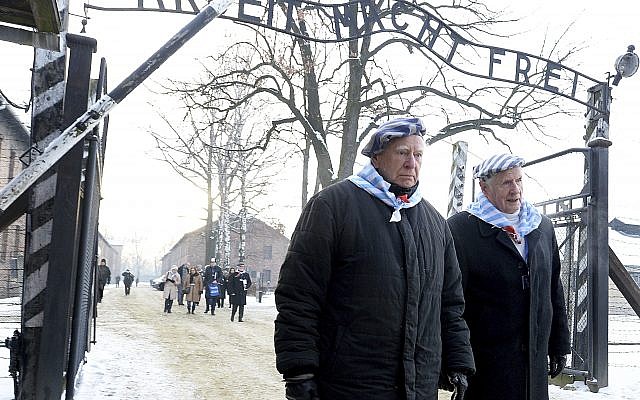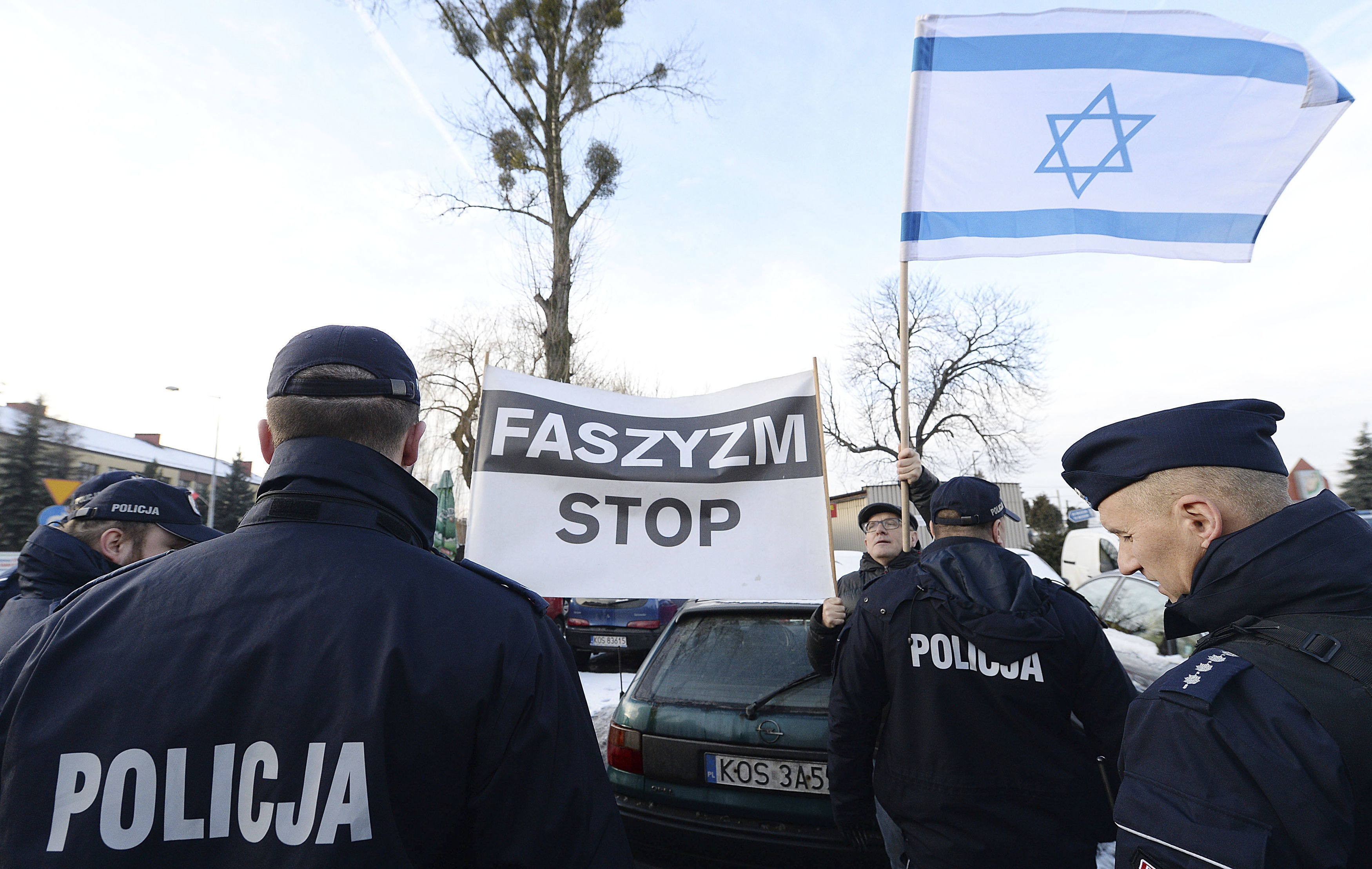Holocaust survivors mark 74th anniversary of Auschwitz liberation at former camp
Far-right demonstrators are separated from counter-protestors by the police as survivors mark International Holocaust Remembrance Day

Holocaust survivors marked the 74th anniversary of the liberation of Auschwitz on International Holocaust Remembrance Day – as far-right protests took place at the former Nazi camp.
In Poland, which was under Nazi occupation during the war, a far-right activist who has served prison time for burning the effigy of a Jew gathered with other nationalists outside the former death camp of Auschwitz ahead of official ceremonies remembering the 1.1 million people murdered there.
Former prisoners placed flowers at an execution wall at Auschwitz. They wore striped scarves that recalled their uniforms, some with the red letter P, the symbol the Germans used to mark them as Poles.
Early in the Second World War, most prisoners were Poles, rounded up by the occupying German forces. Later, Auschwitz was transformed into a mass killing site for Jews, Roma and others, operating until the liberation by Soviet forces on January 27 1945.
The clashes of views at Auschwitz come amid a surge of right-wing extremism in Poland and elsewhere in the West. It is fed by a broader grievance many Poles have that their suffering during the war at German hands is little known abroad while there is greater knowledge of the Jewish tragedy.

However recent surveys show that knowledge of the atrocities during the war is declining generally.
A study released in recent days by the Conference on Jewish Material Claims Against Germany and the Azrieli Foundation found that 52% of millennials in Canada cannot name one concentration camp or ghetto and 62% did not know that six million Jews were killed in the Holocaust.
The past year in Poland has also seen high emotions triggered by a Holocaust speech law that criminalises blaming the Polish nation for the crimes of Nazi Germany, something that sparked a diplomatic crisis with Israel and a surge of antisemitic hate speech.
Since last year’s observances, an 85-year-old French Holocaust survivor, Mireille Knoll, was fatally stabbed in Paris and 11 Jews were gunned down in a Pittsburgh synagogue during Shabbat services, the deadliest attack on Jews in US history – indicating a revival of hate-inspired violence and signs that younger generations know less about the genocide of Jews, Roma and others during the Second World War.
Human Rights First, a US organisation, recalled those killings and warned that “today’s threats do not come solely from the fringe”.
“In places such as Hungary and Poland, once proudly democratic nations, government leaders are travelling the road to authoritarianism,” said Ira Forman, the group’s senior adviser for combating antisemitism.
“As they do so, they are distorting history to spin a fable about their nations and the Holocaust.”
The Polish nationalist, Piotr Rybak, said his group was protesting against the Polish government, accusing it of remembering only murdered Jews and not murdered Poles in yearly observances at Auschwitz.

The accusation is incorrect. The observances at the memorial site pay homage each January 27 to all of the camp’s victims, Jewish and non-Jewish.
Counter-protesters at Auschwitz held up a “Fascism Stop” sign and an Israeli flag, while police kept the two groups apart.
The United Nations recognised January 27 as International Holocaust Remembrance Day in 2005.

Thank you for helping to make Jewish News the leading source of news and opinion for the UK Jewish community. Today we're asking for your invaluable help to continue putting our community first in everything we do.
For as little as £5 a month you can help sustain the vital work we do in celebrating and standing up for Jewish life in Britain.
Jewish News holds our community together and keeps us connected. Like a synagogue, it’s where people turn to feel part of something bigger. It also proudly shows the rest of Britain the vibrancy and rich culture of modern Jewish life.
You can make a quick and easy one-off or monthly contribution of £5, £10, £20 or any other sum you’re comfortable with.
100% of your donation will help us continue celebrating our community, in all its dynamic diversity...
Engaging
Being a community platform means so much more than producing a newspaper and website. One of our proudest roles is media partnering with our invaluable charities to amplify the outstanding work they do to help us all.
Celebrating
There’s no shortage of oys in the world but Jewish News takes every opportunity to celebrate the joys too, through projects like Night of Heroes, 40 Under 40 and other compelling countdowns that make the community kvell with pride.
Pioneering
In the first collaboration between media outlets from different faiths, Jewish News worked with British Muslim TV and Church Times to produce a list of young activists leading the way on interfaith understanding.
Campaigning
Royal Mail issued a stamp honouring Holocaust hero Sir Nicholas Winton after a Jewish News campaign attracted more than 100,000 backers. Jewish Newsalso produces special editions of the paper highlighting pressing issues including mental health and Holocaust remembrance.
Easy access
In an age when news is readily accessible, Jewish News provides high-quality content free online and offline, removing any financial barriers to connecting people.
Voice of our community to wider society
The Jewish News team regularly appears on TV, radio and on the pages of the national press to comment on stories about the Jewish community. Easy access to the paper on the streets of London also means Jewish News provides an invaluable window into the community for the country at large.
We hope you agree all this is worth preserving.





















